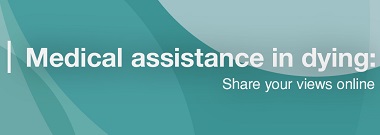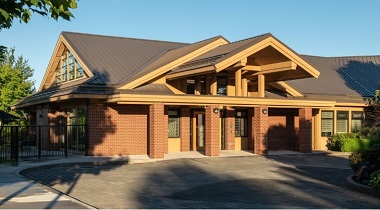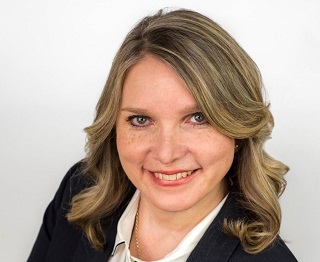
Minister of Justice David Lametti “is now imprudently moving forward to amend the Criminal Code.”
These are dark days for anyone concerned about the protection of life in Canada. We have no laws whatsoever to safeguard unborn children, and now both federal and provincial governments are pressing ahead with euthanasia.
The Liberal Party has introduced legislation which would make assisted death available to people who are not at the end of their lives, while the provincial government says it will withdraw all funding from a hospice that won’t comply with their medical assistance in dying (MAID) policy.
Following are some responses to the federal situation by the Catholic Church and the Evangelical Fellowship of Canada, followed by an explanation of the threat to Delta Hospice Society.
Catholic Bishops’ response
The Canadian Conference of Catholic Bishops issued a strongly-worded response February 26 to Bill C-7: ‘An Act to amend the Criminal Code (medical assistance in dying)’ which was tabled February 24:
The Catholic Bishops of Canada wish to express the greatest concern and dismay in regards to the tabling of Bill C-7 which seeks to expand the eligibility criteria for euthanasia and assisted suicide by removing the “reasonable foreseeability of natural death” criterion currently in the Criminal Code.
The bill would also loosen some of the existing “safeguards” and would even allow patients whose death is “reasonably foreseeable” to waive final consent to receiving euthanasia by making an advance directive.
This means that those who change their minds at a later date, but whose ability to communicate has since been impaired, would be left to express their refusal in potentially vague “words, sounds, and gestures” (Bill C-7, 3.2.c), making it immensely difficult and highly subjective for medical practitioners and lawyers to decipher whether or not the patient still wishes to consent to the lethal procedure.
Discounting the open letter from over 65 of Canada’s leading disability advocate organizations, and ignoring the stark apprehensions expressed in the End of Mission Statement by the United Nations Special Rapporteur on the Rights of Persons with Disabilities concerning the implementation of “Medical Assistance in Dying” in Canada from a disability perspective, the Minister of Justice and Attorney General of Canada regrettably chose not to appeal the Quebec Superior Court decision (Truchon v. Procureur général du Canada) and is now imprudently moving forward to amend the Criminal Code to accommodate the Superior Court’s ruling.
 It is very troubling that the introduction of Bill C-7 was justified on the basis of a highly questionable, biased and rushed online survey, which took place over just two weeks between 13 and 27 January 2020. . . .
It is very troubling that the introduction of Bill C-7 was justified on the basis of a highly questionable, biased and rushed online survey, which took place over just two weeks between 13 and 27 January 2020. . . .
The Catholic Bishops of Canada with Catholic faithful as well as innumerable other Canadians – religious or otherwise – remain opposed to euthanasia and assisted suicide in any form because of their interest in protecting and promoting human life, because it is always wrong to take the life of an innocent person, and because medical science and compassionate care have provided effective ways of easing pain and suffering without having to resort to direct killing.
It would be beneficial to recall once again the World Medical Association’s stance reaffirming its longstanding policy of opposition to euthanasia and physician-assisted suicide.
Go here for the full statement.
Evangelical Fellowship of Canada
The Evangelical Fellowship of Canada also opposes the federal government’s approach. This statement comes from its ‘Euthanasia and Assisted Suicide’ page:
All human life is precious. Life is a gift from God for us to respect and protect through all its stages. Each person’s life has worth, regardless of their age or ability, because they are made in the image of God and loved by him. This belief in the sanctity of all human life compels us to completely oppose euthanasia and assisted suicide.
God calls us to care for those who are vulnerable, including those who are ill or near the end of life. The EFC supports palliative care as a compassionate response that supports and cares for those who are suffering or terminally ill.
Action Alert – early 2020: Changes to the medical assistance in dying law will come into effect in Quebec in March 2020, expanding the law to allow euthanasia even for patients who are not terminally ill. On February 24, the federal government proposed Bill C-7 to enact similar national changes. Read more under the What’s Happening tab.
A February 25 statement said more information and analysis will come soon at www.TheEFC.ca/euthanasia.
Delta Hospice Society

The Delta Hospice Society operates the Irene Thomas Hospice.
A February 25 press release from the provincial government stated that it will be withdrawing its financial support for Delta Hospice Society.
Here is part of the statement:
Fraser Health will stop funding the Delta Hospice Society (DHS) on February 25, 2021, providing the required 365-days notice to end their service agreement without cause.
The termination follows the DHS board’s refusal to comply with the provincial medical assistance in dying (MAiD) policy.
The contract had provided DHS approximately $1.5 million annually. This covered 94 percent of the society’s costs to operate 10 beds at the Irene Thomas Hospice – a facility on land Fraser Health owns. Fraser Health will use the next year to ensure Delta residents continue to have access to those beds.
“We have made every effort to support the board to come into compliance and they have been clear that they have no intention to,” said Adrian Dix, Minister of Health. “We are taking this action reluctantly, and when the role of the Delta Hospice Society concludes, patients in publicly funded hospice care will again be able to fully access their medical rights.”
Go here for the full statement.

Angelina Ireland is “shocked and outraged” by the actions of Fraser Health.
A B.C. Catholic story by Agnieszka Ruck describes the reaction from Delta Hospice:
Delta Hospice Society president Angelina Ireland is “shocked and outraged” that the BC government will pull all funding from the hospice by 2021.
She does not buy Dix’s statement that the action was taken reluctantly:
. . . Ireland doesn’t see it that way. In a February 26 statement she said the government cancelled the contract with Delta Hospice “abruptly” and “without even acknowledging or responding” to the hospice’s attempts to negotiate.
“The actions of the ministry reveal that the issue of MAiD (medical assistance in dying) vs. palliative care is an agenda-driven policy rather than one that ensures access to skilled and compassionate palliative care.”
Delta Hospice has been serving the public since 1991. When assisted suicide became legal in 2016, it was made available at the Delta Hospital across the street, which shows accessibility is not the issue, says Ireland.
“If the government wants to open MAiD facilities, that’s their option, but they must not be allowed to download it onto the backs of private palliative care facilities.”
Go here for the full story.

I have to disagree with you on this one. Hospice is where people go to die. Most are funded by us the taxpayers. The only thing they have to do is not force people out into the rain where they have to sit on a bus bench to be able to discuss their options or be painfully transferred to another facility because they have decided it is time to go now rather than later after a lingering painful time.
This arbitrary and high-handed push by the federal and BC provincial governments continues the imposition of their ideologically-driven value system under the guise of individual legal rights, foisting mandatory compliance and not giving Canadians any choice. Choice is their mantra when it suits them but when it doesn’t, they ignore it. They pull the levers of power and are not afraid to let the rest of us know they’re in charge. Religious persecution in Canada is already here and it is coming from our governments. Pray!